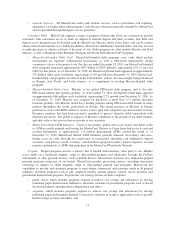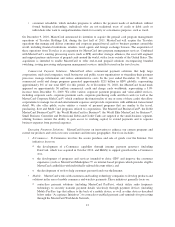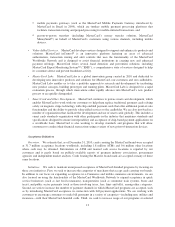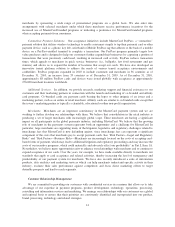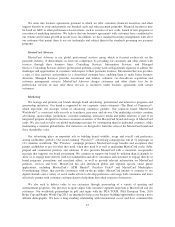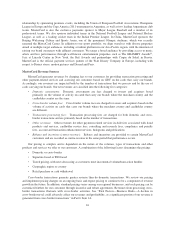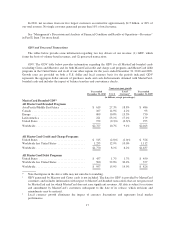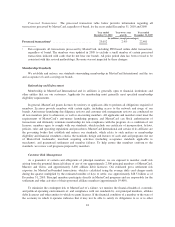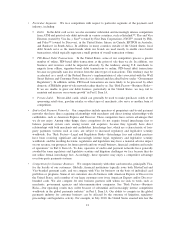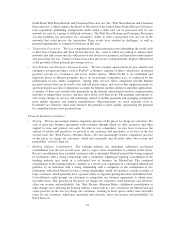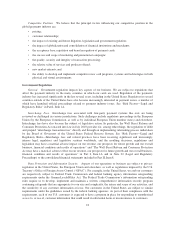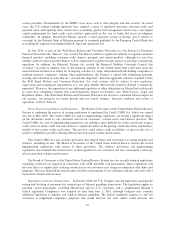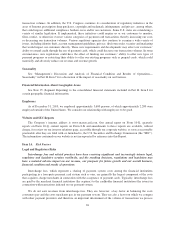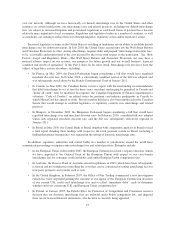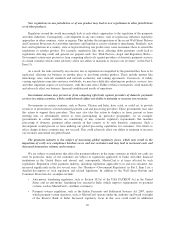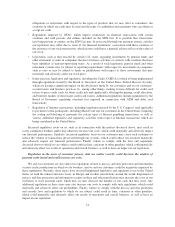MasterCard 2010 Annual Report Download - page 31
Download and view the complete annual report
Please find page 31 of the 2010 MasterCard annual report below. You can navigate through the pages in the report by either clicking on the pages listed below, or by using the keyword search tool below to find specific information within the annual report.•Particular Segments. We face competition with respect to particular segments of the payment card
industry, including:
ODebit. In the debit card sector, we also encounter substantial and increasingly intense competition
from ATM and point-of-sale debit networks in various countries, such as Interlink™, Plus and Visa
Electron (owned by Visa Inc.), Star®(owned by First Data Corporation), NYCE®(owned by FIS),
and Pulse™ (owned by Discover), in the United States; Interac in Canada; EFTPOS in Australia;
and Bankserv in South Africa. In addition, in many countries outside of the United States, local
debit brands serve as the main brands while our brands are used mostly to enable cross-border
transactions, which typically represent a small portion of overall transaction volume.
OPIN-Based Debit Transactions. In the United States, some of our competitors process a greater
number of online, PIN-based debit transactions at the point of sale than we do. In addition, our
business and revenues could be impacted adversely by the tendency among U.S. merchants to
migrate from offline, signature-based debit transactions to online, PIN-based debit transactions
because we generally earn less revenue from the latter types of transactions. This tendency may be
accelerated as a result of the Federal Reserve’s implementation of rules associated with the Wall
Street Reform and Consumer Protection Act (as defined and described below under “Government
Regulation”). In addition, online, PIN-based transactions are more likely to be processed by other
domestic ATM/debit point-of-sale networks rather than by us. See “Risk Factors—Business Risks—
If we are unable to grow our debit business, particularly in the United States, we may fail to
maintain and increase our revenue growth” in Part I, Item 1A.
OPrivate-Label. Private-label cards, which can generally be used to make purchases solely at the
sponsoring retail store, gasoline retailer or other types of merchants, also serve as another form of
competition.
•End-to-End Payment Networks. Our competitors include operators of proprietary end-to-end payment
networks that have direct acquiring relationships with merchants and direct issuing relationships with
cardholders, such as American Express and Discover. These competitors have certain advantages that
we do not enjoy. Among other things, these competitors do not require formal interchange fees to
balance payment system costs among issuers and acquirers, because they typically have direct
relationships with both merchants and cardholders. Interchange fees, which are a characteristic of four-
party payments systems such as ours, are subject to increased regulatory and legislative scrutiny
worldwide. See “Risk Factors—Legal and Regulatory Risks—Interchange fees and related practices
have been receiving significant and increasingly intense legal, regulatory and legislative scrutiny
worldwide, and the resulting decisions, regulations and legislation may have a material adverse impact
on our revenue, our prospects for future growth and our overall business, financial condition and results
of operations” in Part I, Item 1A. To date, operators of end-to-end payment networks have generally
avoided the same regulatory and legislative scrutiny and litigation challenges we face because they do
not utilize formal interchange fees. Accordingly, these operators may enjoy a competitive advantage
over four-party payments systems.
•Competition for Customer Business. We compete intensely with other card networks, principally Visa,
for the loyalty of our customers. Globally, financial institutions typically issue both MasterCard and
Visa-branded payment cards, and we compete with Visa for business on the basis of individual card
portfolios or programs. Some of our customers also do business with American Express or Discover in
the United States, and a number of our large customers now issue American Express and/or Discover-
branded cards. We also compete for new business partners with whom we seek to work, such as
merchants, government agencies and telecommunication companies. See “Risk Factors—Business
Risks—Our operating results may suffer because of substantial and increasingly intense competition
worldwide in the global payments industry” in Part I, Item 1A. Our ability to compete in the global
payments industry for customer business can be affected by the outcome of litigation, regulatory
proceedings and legislative activity. For example, in July 2010, the United States enacted into law the
21


